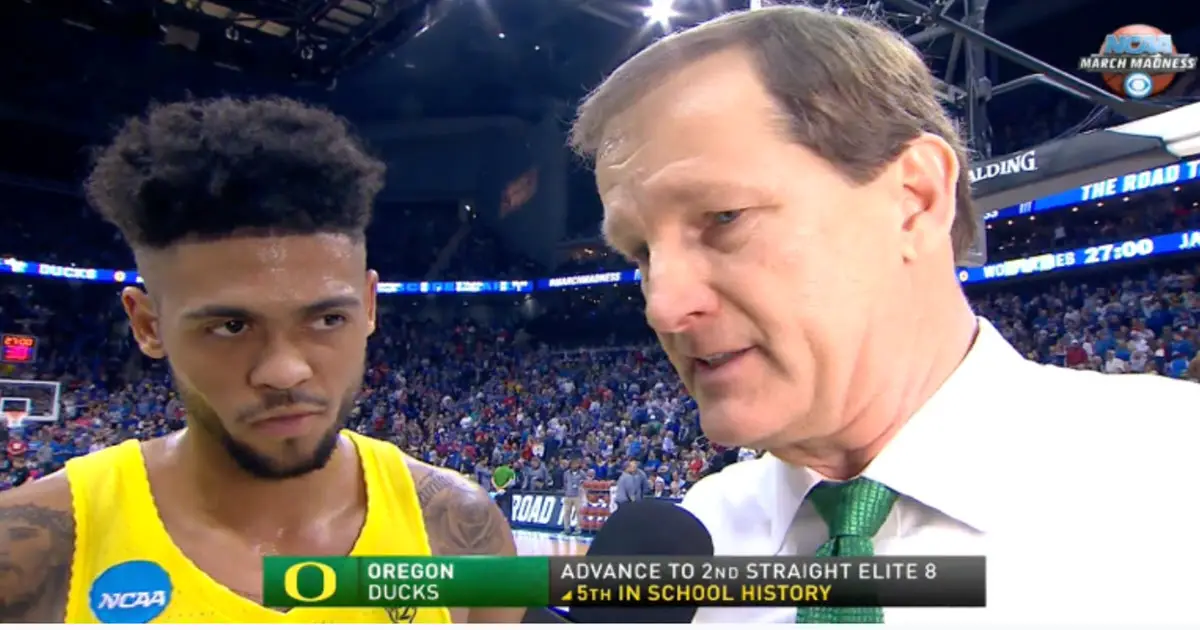Head Coach Dana Altman is the all-time coaching wins leader for Oregon Basketball. One of the winningest active coaches in NCAA Division 1 coaching, Altman has led his teams to 669 victories, ranking him in the Top Ten of active D-1 coaches. His combined record is 259-103 (.715) over 10 seasons at Oregon, surpassing prior leader Ernie Kent‘s record of 235 wins.
Coach Altman will be 62 years old entering the 2020 season. His career stops include head coaching positions at Marshall, Kansas State, Creighton and Oregon. Altman’s record at those four universities is 669-346 (.659). His record in 16 seasons with the Creighton Bluejays was 327-176 (.650), giving him the most wins in Creighton history.
Altman has won a variety of prestigious awards from the media and his coaching peers. He has won Coach of the Year awards in the Southern Conference (SoCon), Big Eight, Missouri Valley Conference (MVC) and three times at Oregon in the Pac-12 (2013, 2015, 2016).
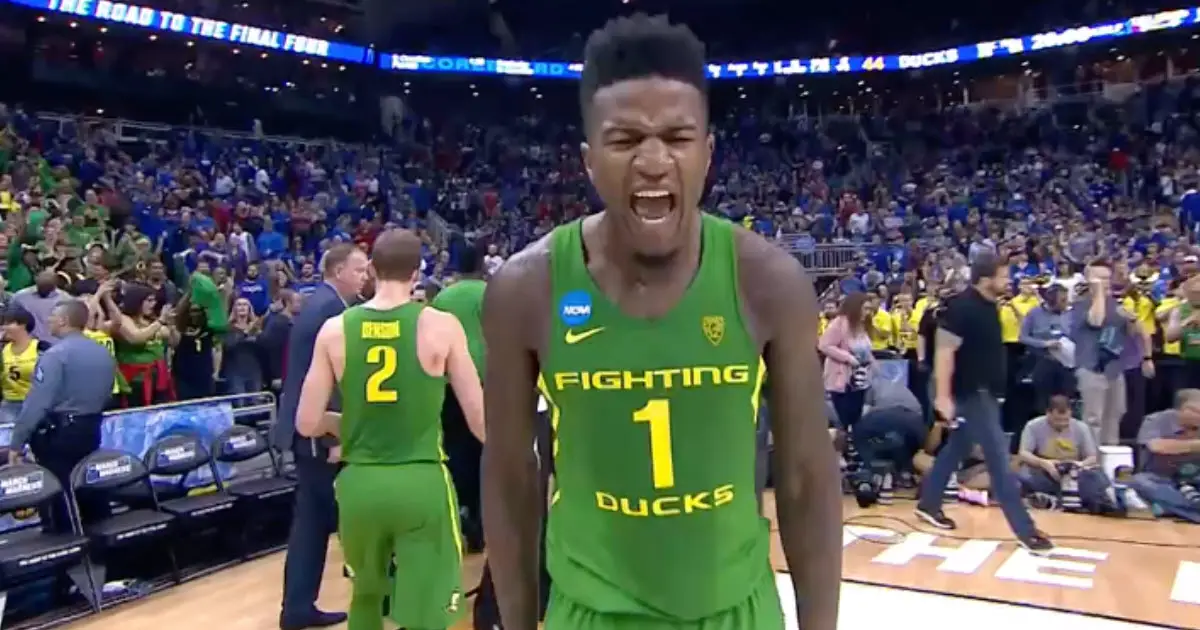
Jordan Bell could be intense.
All these accolades notwithstanding, Altman has yet to win a national championship, illustrating how difficult and elusive the national title is for even the best coaches. There are recurring hurdles every coach and program must overcome to reach this pinnacle; below are a few of the specific challenges faced by the Oregon program and Coach Altman specifically.
Recruiting and Developing Dominant Big Men
With a few exceptions, Oregon’s teams have lacked dominant big men. Whatever the reasons may be, Oregon does not seem to land bigs with the bulk, speed, strength and hands of the top-level athletes often seen on upper-tier teams of the B1G, ACC or Big 12 conferences.
The Ducks under Coach Altman have had a few solid big men in the program, most recently Chris Boucher, Bol Bol and Jordan Bell to name a few. Farther back were Blair Rasmussen, E.J. Singler, Marty Leunen and perhaps the best of them all—Greg Ballard, a member of Oregon’s legendary Kamikaze Kids. While there are many great players in this group, truly dominant big men are few and far between and recruited heavily by the other leading teams. They are difficult to land and even harder to groom, coach and develop into truly dominant scorers and defenders.
Have you ever wondered why Oregon has consistently dealt with a deficit of dominant power forwards and posts? Most of the high-potential bigs Coach Altman has brought to the program either left early, never developed to full potential or suffered multiple injuries that ultimately limited their on-court contributions.
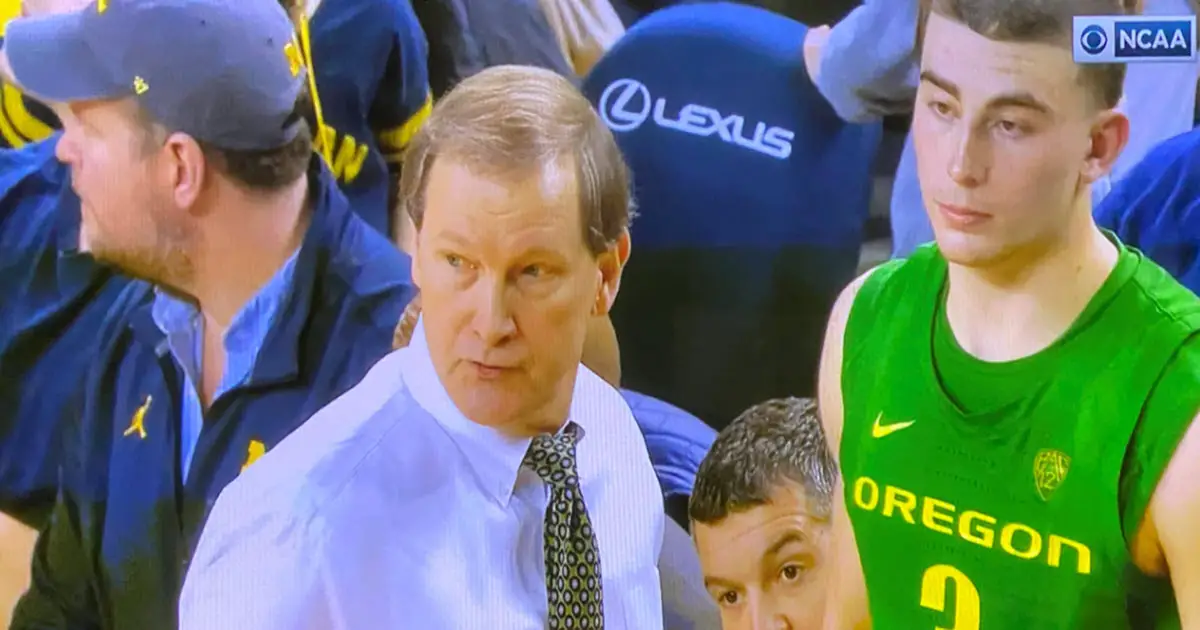
Dana Altman with Payton Pritchard versus Michigan.
Guard-focused Weave Offense
Altman is a recognized master of the outside weave offense. This offense leaves the paint open for penetration drives and facilitates the quick ball movement that can catch a defense out of place. Despite these strengths, the outside weave takes offensive players away from the basket, leaving defenders in superior rebounding positions. Offensive rebounding is difficult enough on its own—does the weave offense make the task even taller than it might be with another type of offense? One could argue that, from a rebounding perspective, Altman’s offense leaves big men out of position at the shot and his comparatively undersized guards outmatched by their defenders.
Reliance on the 3-Point Shot
Coach Altman’s offense relies on high percentage 3-point shooting, no surprise given that college basketball has become a 3-point game overall, but still a potential area of vulnerability. As the adage goes, “You live and die with the 3“. More so than many other offenses, Altman’s outside weave offense relies on high-percentage shooting from outside the arc. As any Duck hoops fan can attest, trouble brews rapidly when your 3-point shots aren’t dropping.
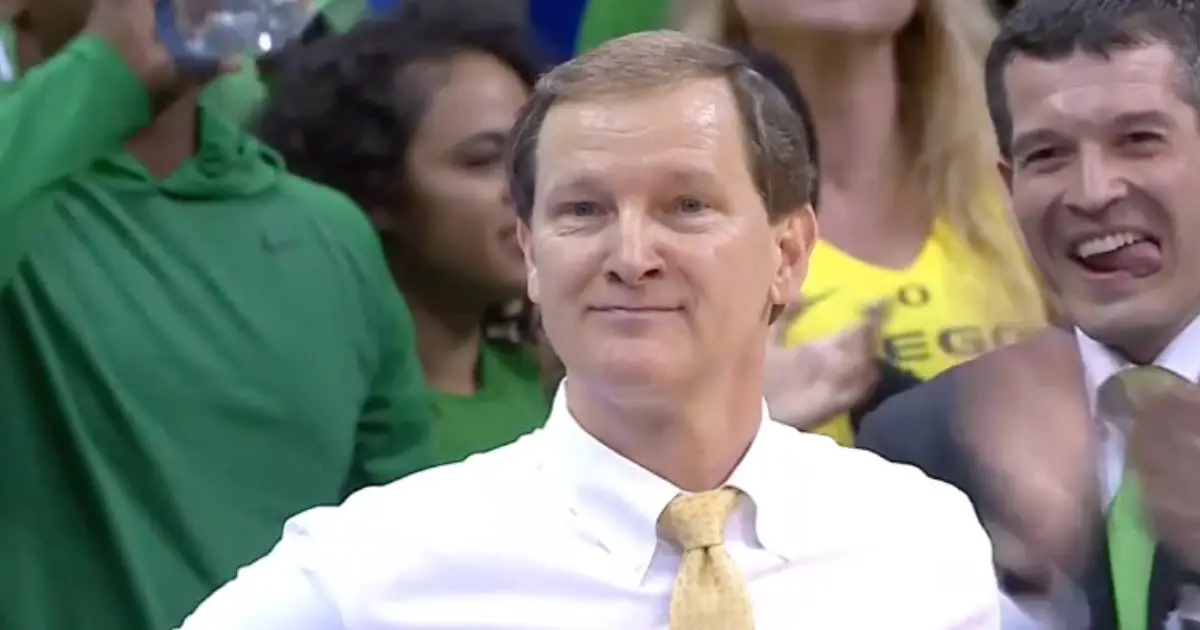
A rare smile from Dana Altman.
Player Turnover and Other Modern Challenges
In fairness to Coach Altman, winning consistently in today’s basketball environment is more difficult than ever with recent NCAA rules changes and the declining loyalty of student-athletes. Players come and go more freely than ever. Coaches must juggle variables and demands that didn’t exist before. Coach Altman is well-known for developing his players and his teams through time. Players get better each year during their college career, and Coach Altman’s teams are invariably better at the end of the year than they were when the season began. Fewer coaches past or present are as highly-regarded as Altman in these areas.
In March 2019, Oregon extended Coach Altman’s contract through the 2026 season. One might expect that Oregon will guard its prize by extending his contract again before 2026. In fact, it’s easily conceivable that Altman could coach another 10 years or more, adding wins, laurels, awards and championships to his already-stellar record. By that time, Altman may have won more than 900 games, joining the company of legendary coaches like Adolph Rupp, Dean Smith, Roy Williams, Jim Boeheim and Bobby Knight.
But, will Coach Altman ever win a national championship to crown his remarkably successful coaching career? Either way, he most certainly will have won most other honors and enjoyed an extraordinary career.
Brent Pennington
Greenville, South Carolina
Top Photo from Video
Brad Nye, the FishDuck.com volunteer editor for this article, conserves land in Central Oregon.
Related Articles:
Oregon Football: Early 2026 Ranking Projections
FishDuck Foaming Over Upside of 2026 Diamond Ducks
Unbelievable...Same SEC Stuff, Different Day
Why Oregon Football Always Belongs in the National Conversation
The B1G Won the 2026 Coaching Carousel...Big-Time!
Continuity? Lanning's Hiring Success is Put to the Test
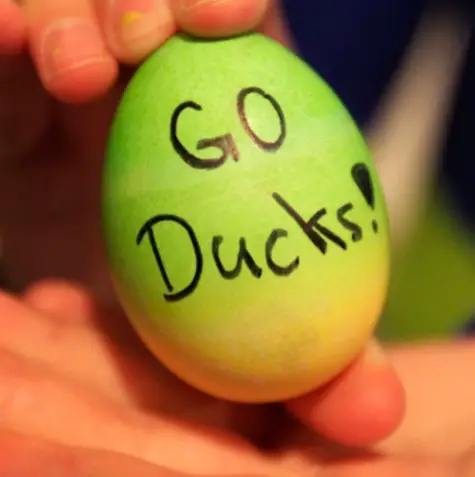
Born in Eugene, Brent Pennington grew up along the Siuslaw river in Lane county. He attended his first Ducks football game in 1960, and was inside Autzen stadium for its opening game in ’67. Brent attended the UO College of Business Administration from 1969-1975 interrupted by U.S. Army service. He has traveled much of the world in the Lotteries and Gaming industry.

